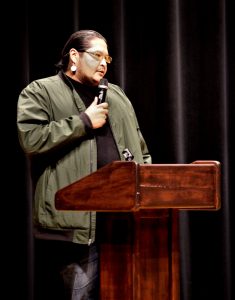EPA hears resounding ‘no’ on proposed water permits for Black Hills uranium mining

Oglala Lakota tribal member Kyle White was one of many who testified in defense of Lakota treaty territory.
HOT SPRINGS – One hundred percent of the comments here at the Oct. 5 EPA hearing on water permits for the Dewey Burdock Project were against the proposed uranium mining in the aquifers of the Black Hills, center of the Oceti Sakowin’s unceded 1868 Ft. Laramie Treaty territory.
“Hopefully, the EPA got the hint,” said the Black Hills Clean Water Alliance, which organized transportation for witnesses from Rapid City, Cheyenne River Sioux Indian Reservation and Pine Ridge Indian Reservation.
The Black Hills Clean Water Alliance, as well as the Oglala Sioux Tribe, Dakota Rural Action, The Magpie Organizing Collective, the Inter-Mountain West Uranium and Water Summit, and others oppose any grant of water permits for the project, because of its impact on cultural and natural resources.
The project would be the first radioactive in-situ leach mining in South Dakota. It would be located on 10,000 acres of Custer and Fall River counties adjacent to the Pine Ridge Indian Reservation and upstream at the headwaters of the Cheyenne River.
The in-situ technique leaches uranium from the rock by injecting chemicals into the underground water table to dissolve the deposits. Pumps then force the minerals in solution through pipes to the surface. There, the radioactive material is refined into yellow cake for shipment to nuclear fuel and weapons manufacturers. The wastewater is disposed either on the surface or back underground.
The EPA’s Denver branch office is in charge of the application for two permits to punch some 4,000 new injection well holes in the aquifers for this process. The applicant is Canadian Chinese Azarga Uranium Corp., doing business as Powertech USA Inc.
The EPA office still is taking public comment on the applicant’s request for the agency to exempt the operator from compliance with the quality standards of the Clean Drinking Water Act in order to proceed.
An exemption would be needed to carry out the project because “the restoration of an in-situ leach-mined aquifer to pre-mining water quality is an impossibility,” the Nuclear Regulatory Commission states.
The office will be accepting written comment until Dec. 9 on the proposed exemption and on the well permits to provide 8,500 gallons per minute for mining indefinitely, then dispose the process water underground.
EPA has provided a table summarizing the substantive changes it has made on the proposed permits, based on comments at the earlier hearings in 2017.
The table is available at www.epa.gov/uic/proposed-changes-epa-draft-permit-documents-dewey-burdock
Written comments may be submitted online at www.regulations.gov under docket number EPA-R08-OW-2019-0512. Comments also may be sent by mail to Valois Robinson, U.S. EPA Region 8, Mail Code: 8WD-SDU, 1595 Wynkoop St., Denver, CO 80202-1129.
(Contact Talli Nauman at talli.nauman@gmail.com)
